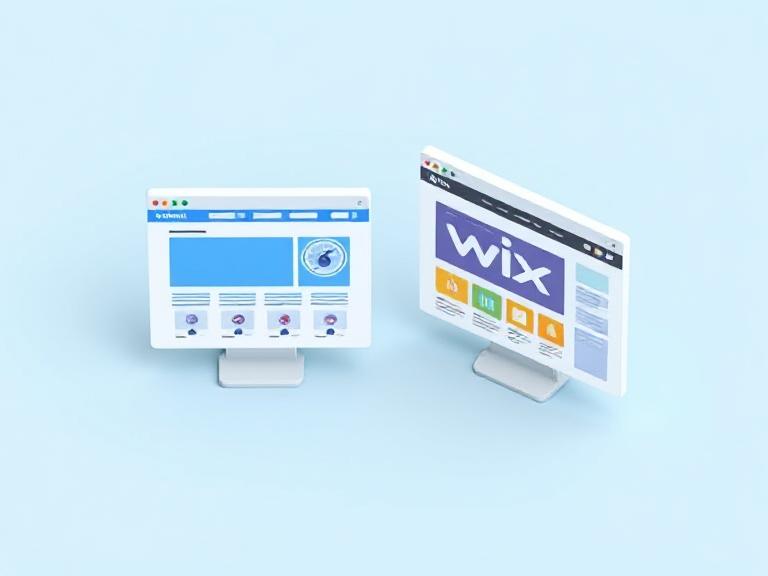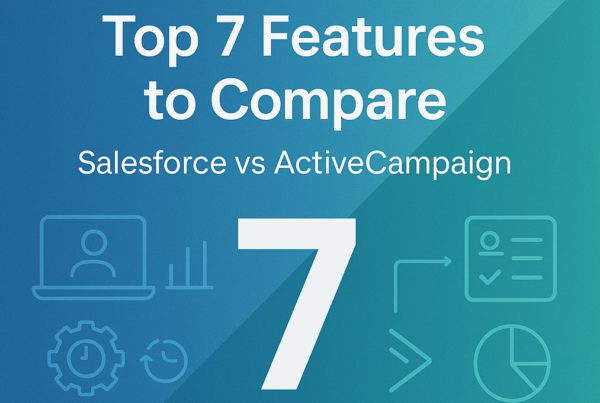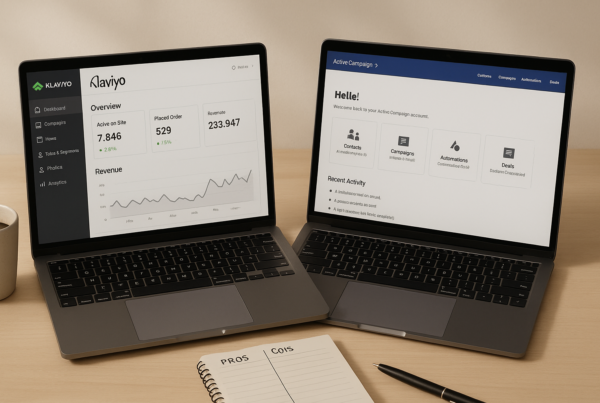Choosing between Volusion and Wix for your online store? The answer isn’t as simple as it seems. While Volusion scores higher on platforms like the Wheelhouse scale, that doesn’t tell the whole story. Each platform caters to different seller needs, so the better option depends on your priorities, budget, design, and whether you require advanced e-commerce tools.
Wix has the pricing edge, starting at just $17 per month, compared to Volusion’s $ 35-per-month entry plan. But that’s not all. Wix supports up to 50,000 products even on its basic plan, while Volusion limits you to just 50. Wix also excels in design flexibility, offering over 800 templates (including more than 100 specifically designed for e-commerce). At the same time, Volusion lags with only 30.
That said, Volusion offers stronger built-in e-commerce tools for serious sellers. However, Wix wins in speed, user satisfaction, and reliability, scoring 4.4/5 compared to Volusion’s 3.8. In this comprehensive Volusion vs Wix guide, we’ll compare eight key performance areas to help you choose the best fit.
Pricing Plans and Value
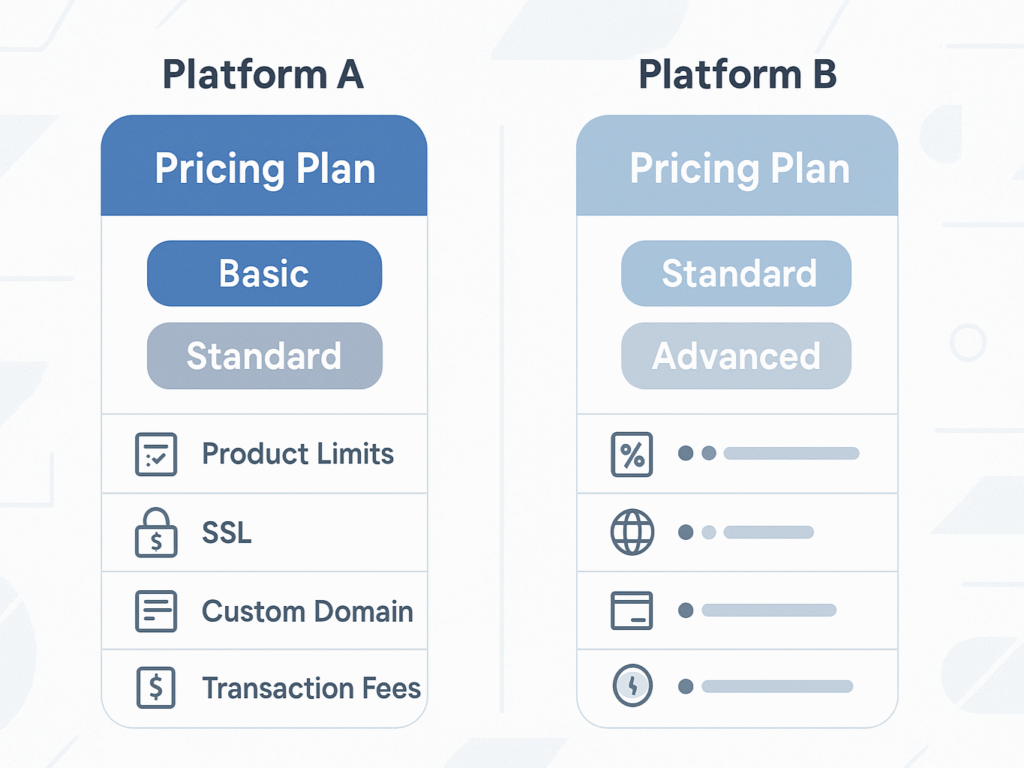
Wix: $17–$159/month vs Volusion: $35–$299/month
When considering budget constraints for your e-commerce store, pricing plays a crucial role in decision-making. Wix offers substantially more affordable options with plans starting at just $17/month for the Light plan, rising to $29/month for Core, $36/month for Business, and $159/month for Business Elite.
In contrast, Volusion’s pricing starts at a higher entry point of $35 per month for the Personal plan, $79 per month for the Professional plan. The Business plan costs $299 per month. For a comprehensive analysis of Volusion’s current pricing structure and features, refer to our detailed Volusion review, which breaks down the value proposition of each plan.
Notably, Volusion offers a 10% discount if you choose to pay annually rather than monthly. It can slightly reduce the cost gap, yet Wix remains the more cost-effective option by a significant margin. For merchants seeking the highest-tier services, the difference becomes even more pronounced. Wix’s premium Business Elite plan costs $159 per month, compared to Volusion’s Business plan at $299 per month.
Both platforms provide essential e-commerce features, including custom domains, SSL certificates, and hosting. Additionally, Wix includes a free domain for one year on all paid plans, providing extra value for new store owners.
Product Limits: 50,000 vs 100 Products on Entry Plans
The disparity in product capacity between these platforms is striking. Wix allows you to list up to 50,000 products, even on its entry-level plans. This generous allocation makes Wix particularly attractive for merchants with extensive inventories or plans to scale quickly.
Conversely, Volusion’s plan ($35 per month) restricts you to just 100 products. To increase this capacity, you must upgrade to the Professional plan, which costs $79 per month and supports up to 5,000 products. For unlimited product listings on Volusion, you’ll need to invest in the $299 per month Business plan.
This fundamental difference in product limits significantly impacts the value proposition of each platform. A store with 500 products would require Volusion’s $ 79-per-month Professional plan. In contrast, the same store could operate on Wix’s $ 29-per-month Core plan, resulting in substantial annual savings.
Transaction Fees and Hidden Costs
Fortunately, neither Wix nor Volusion charges transaction fees on their e-commerce plans. This absence of per-transaction costs provides merchants with predictable monthly expenses. Nevertheless, standard payment processing fees from payment gateways (typically 1.5-3% plus $0.30 per transaction) still apply on both platforms.
Several hidden costs merit consideration when evaluating total ownership expenses. For Volusion, a significant additional expense is the requirement for an SSL certificate. Unlike most e-commerce platforms that include this security feature for free, Volusion charges between $89 and $995 per year for SSL certificates. Only customers on the Prime plan (custom pricing) receive a free SSL certificate.
Additional potential expenses for both platforms include:
- Domain registration costs ($10-20/year if not using the free domain offer)
- App and extension fees ($0-100+/month for additional functionality)
- Development costs for customization ($500-10,000+ for professional help)
Volusion offers more built-in e-commerce features without requiring additional apps, potentially reducing long-term costs for merchants needing advanced functionality. For instance, abandoned cart recovery and product reviews are included in Volusion’s Professional plan. In contrast, Wix might require separate app integrations that incur ongoing costs.
In value-for-money assessments, Volusion scored just 2.4 out of 5 stars in independent research, suggesting that despite higher prices, merchants may not receive proportionally better features compared to more affordable alternatives, such as Wix.
Shopify vs. Volusion: An Honest Comparison for New Store Owners: Discover Which Platform Offers Better Value for Beginners. Compare features, pricing, and scalability options to make an informed decision for your first online store.
Template Variety and Design Options
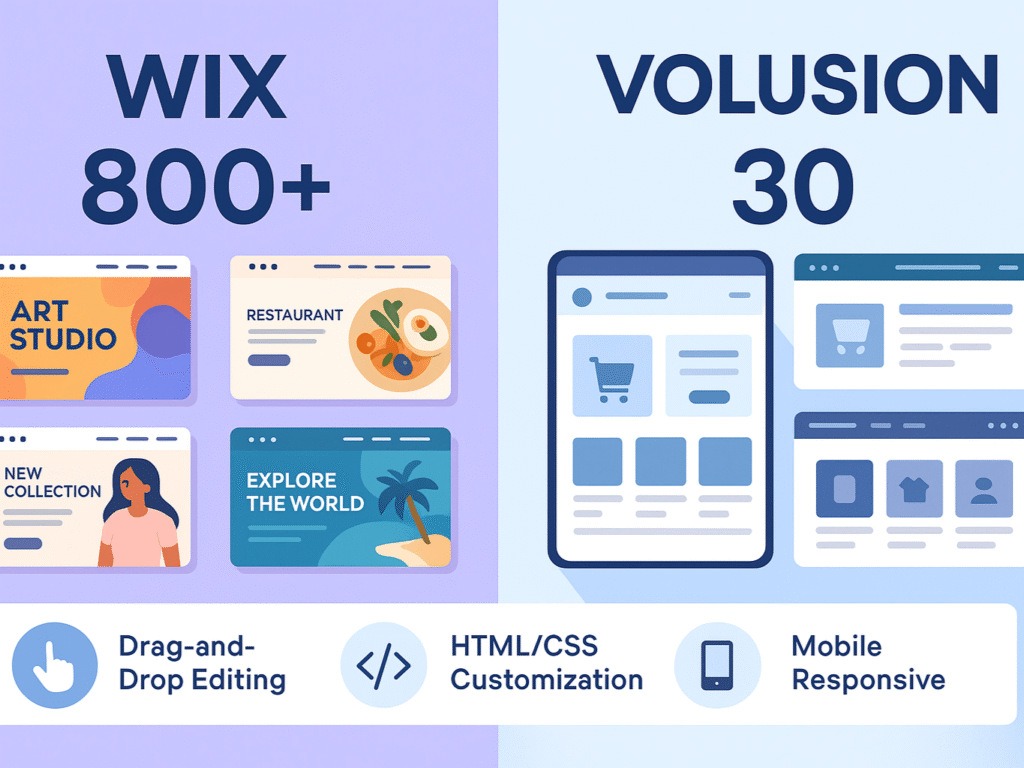
The visual appeal of your online store plays a pivotal role in attracting and retaining customers, which is why the Volusion vs Wix template comparison is crucial. A distinct difference emerges immediately when analyzing design capabilities between these platforms.
Wix Templates: 800+ vs Volusion Templates: 30
The disparity in template libraries between these platforms is substantial. While Wix offers over 800 professionally designed templates, Volusion provides approximately 30 templates total. This significant difference in design options often influences merchants’ platform decisions.
For those seeking alternatives with extensive template libraries, our Volusion review examines how the platform’s limited design options compare to current market standards and whether the advanced customization capabilities compensate for fewer template choices.
Volusion, in contrast, provides approximately 30 templates in total. These include both free and premium options, with premium themes costing around $180. Although limited in quantity, Volusion’s themes are professionally crafted by designers specializing in online storefronts.
For convenience, Wix organizes its templates into more than 70 industry categories, allowing for efficient browsing based on your specific business type. This categorization system saves considerable time during the initial setup process, especially for business owners unfamiliar with web design principles.
Mobile Responsiveness and Industry-Specific Designs
Both platforms prioritize mobile optimization, though with different approaches. All Volusion themes are fully responsive by default, automatically adjusting to provide optimal viewing experiences across desktop computers, tablets, and mobile devices. This built-in responsiveness ensures your store maintains visual integrity regardless of how customers access it.
Wix templates are also mobile-ready, offering a dedicated mobile editor. Nevertheless, some Wix templates may require manual adjustments to ensure complete mobile responsiveness, which could increase setup time.
Regarding industry specialization, Volusion designs its themes to meet the needs of businesses across all verticals. The platform focuses on eCommerce-specific features that drive conversions. Wix goes further by offering templates categorized by:
- Business type (Technology, Fashion & Beauty, Creative)
- Website features (Stores, Bookings, Portfolio, Blog)
- Design style (Dark, Minimal, Illustrative, Typography)
This granular categorization helps you find templates that not only look appealing but also contain industry-specific functionality.
Customization Flexibility: Drag-and-Drop vs HTML/CSS
The customization capabilities differ significantly between platforms. Wix employs an intuitive drag-and-drop editor that simplifies design customization. This visual editor allows you to manipulate elements directly on the page without requiring technical expertise. Wix also offers two editing options: Wix ADI (Artificial Design Intelligence) for beginners and the Standard Editor for those who want more control.
Volusion provides a WYSIWYG (What You See Is What You Get) editor, making basic customizations straightforward. Its primary advantage lies in advanced customization options. Volusion permits direct HTML and CSS code editing. This capability gives technically proficient users virtually unlimited design flexibility.
With Volusion, you can:
- Modify colors, fonts, and layouts through the built-in theme editor
- Upload custom logos and create banners
- Edit HTML/CSS for advanced modifications
Essentially, Wix excels in user-friendly design customization that requires no coding knowledge, making it accessible to beginners. Conversely, Volusion offers deeper customization potential for those with technical skills, though its interface may present a steeper learning curve.
Both platforms enable you to create professional-looking stores. Yet, your choice ultimately depends on whether you prioritize design variety and simplicity (Wix) or advanced customization capabilities (Volusion).
Ease of Use and Learning Curve
Setting up an online store requires platforms that strike a balance between functionality and accessibility, making the Wix vs Volusion for ecommerce decision crucial for new merchants. Both Wix and Volusion offer distinct approaches to store creation and management, with significant differences in their learning curves and user experience.
Wix ADI vs Volusion Setup Wizard
Getting started quickly is where Wix truly excels with its AI Design Intelligence (ADI) system. This innovative tool automatically creates your website by simply specifying the type of site you want and your preferred aesthetic. The system then generates a fully functional website that you can refine to meet your specific needs.
Volusion takes a more traditional approach with its setup wizard. While still user-friendly, it doesn’t offer the same level of automation as Wix ADI. The platform provides a step-by-step process for store creation, guiding you through essential setup tasks, including storefront design, inventory setup, and payment configuration.
Both platforms enable you to launch without prior coding knowledge; however, Wix’s AI-powered approach significantly reduces the initial setup time for newcomers to e-commerce.
Editor Experience: Visual vs Structured
The fundamental difference between these platforms becomes apparent in their editing interfaces. Wix provides a highly visual, drag-and-drop editor that empowers complete freedom in customization. This intuitive approach lets you place elements precisely where you want them on your page without restrictions.
Initially, the Wix editor may seem overwhelming due to its numerous options. Nevertheless, once you become familiar with the interface, what first appears daunting becomes empowering, offering extensive customization capabilities without requiring technical expertise.
Meanwhile, Volusion employs a more structured editing approach. Its interface is well-organized and focused specifically on e-commerce functionality. The platform offers:
- Store builder tools requiring no coding knowledge
- Straightforward processes for managing inventory
- Simplified payment gateway setup
- Built-in tools for order management
Volusion sometimes requires HTML/CSS knowledge for advanced customizations, which presents a steeper learning curve for users without technical backgrounds. Consequently, while both platforms allow extensive customization, Volusion often demands more technical skill for advanced changes.
Beginner Friendliness and Onboarding
For absolute beginners, Wix consistently rates higher in user-friendliness. Independent evaluations frequently praise Wix for its exceptional accessibility to novices. Its interface design prioritizes intuitive navigation, making it approachable for users with minimal technical expertise.
Indeed, according to user reviews, Wix provides a “pretty nice tool to set up a website, even if you are not an industry pro”. The platform offers “multiple amazing tools for organizing stuff like links, images, videos, etc,” that simplify website creation substantially.
- Volusion scored 5/5 for ease of use in expert evaluations, praised as “incredibly intuitive” for managing core e-commerce tasks.
- Trustpilot reviews highlight Volusion as very user-friendly, even for those with no prior e-commerce experience.
- Volusion offers 24/7 customer support, with users commending the team for being helpful, patient, and empowering during the onboarding process.
- Wix support is more limited, relying on ticketing and callback systems, with no live chat, which may slow down the resolution of urgent issues.
The learning curve for Wix primarily relates to the abundance of features rather than their complexity. Once users navigate the initial feature overload, the platform becomes straightforward to operate. Volusion presents a more focused e-commerce experience that might feel more intuitive to users specifically seeking shopping functionality without extraneous features.
Ecommerce Capabilities: Volusion vs Wix

Beyond design and pricing considerations, the core functionality of any online store depends on its e-commerce tools. When comparing Wix vs Volusion for ecommerce, both platforms offer unique approaches to essential selling features that significantly impact daily operations.
Inventory Management: Basic vs Advanced
Fundamentally, the inventory management capabilities between these platforms reveal their different market positioning. Volusion excels in this area, offering advanced inventory tools designed specifically for serious e-commerce businesses. The platform provides easy listing creation, automated stock level adjustments, and streamlined restocking processes.
This comprehensive approach makes Volusion particularly suitable for merchants managing complex inventories with multiple variables. If you’re considering other platforms with similar capabilities, our BigCommerce vs. Volusion comparison explores how these two enterprise-focused solutions compare to each other.
Wix takes a more streamlined approach to inventory management, focusing on simplicity rather than advanced features. While adequate for smaller stores or businesses with straightforward product catalogs, you might find limitations when managing larger inventories or complex product variations.
Significantly, the difference extends to product organization. Volusion supports extensive product tagging and categorization systems, allowing creation of multiple category levels and nested subcategories for complex hierarchies. This sophisticated structure helps customers navigate extensive product catalogs more efficiently.
Checkout and Payment Gateways
The checkout experience has a direct impact on conversion rates, with statistics showing that over 70% of shoppers abandon their carts without completing a purchase. Both platforms address this challenge differently.
Volusion’s payment processing capabilities include integration with numerous popular gateways:
- PayPal and Stripe
- Network Merchants and CyberSource
- Amazon Pay and Authorize.net
- Money Order options
Additionally, Volusion offers its payment system, Volusion Merchant Service. The platform recently introduced a Premium Checkout feature, enhancing the overall purchase experience.
Alternatively, Wix provides its proprietary Wix Payments system, a complete payment solution that eliminates the need for third-party providers. Through this system, you can accept:
- Debit and credit cards
- Tap to Pay on iPhone
- Apple Pay and various digital wallets
Digital wallets have surpassed credit cards as the preferred payment method in North America, with a projected 54% share of all e-commerce transactions by 2026. Both platforms support these payment trends, though Wix offers slightly more streamlined integration.
For checkout optimization, Wix allows guest checkout by default, which is critical since forced account creation is the second most common reason for cart abandonment. Volusion also offers guest checkout capabilities, though its process typically involves more steps compared to Wix’s minimalist approach.
Abandoned Cart Recovery and Upselling Tools
Addressing the 70% cart abandonment rate requires effective recovery strategies. Both platforms offer abandoned cart recovery solutions, though with different approaches.
Wix provides a comprehensive abandoned cart automation system through Wix Automations. This feature sends personalized emails to customers who abandon their carts, including product images and direct links to complete purchases. The system defines abandoned carts when:
- Items are added but not purchased
- No changes are made for at least an hour
- The customer’s email address is available
Volusion similarly includes abandoned cart recovery in its feature set, though it’s only available on the Professional plan and above. It represents a potential limitation for merchants on entry-level plans.
For upselling opportunities, Wix enables product suggestions during checkout through App Market integrations, such as AppSell. These tools create customized upsell funnels directly on the checkout page. Volusion offers similar upselling capabilities, particularly excelling in product status adjustments and quantity parameter settings that facilitate special promotions.
Volusion or BigCommerce: Which Platform Helps You Scale Faster?: Explore two robust e-commerce solutions designed for growth. Discover which platform offers the best tools, integrations, and support for growing your online Business effectively.
App Integrations and Plugin Ecosystem
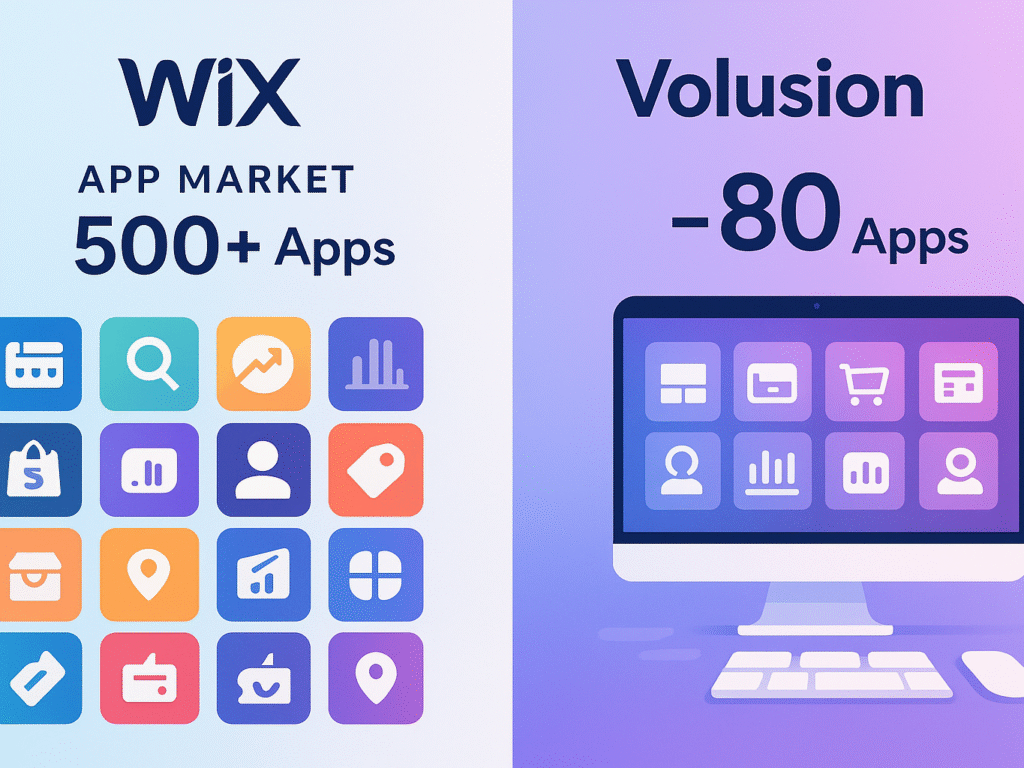
The extensibility of your e-commerce platform fundamentally determines how well it can grow with your business needs, which is why evaluating Wix vs Volusion for ecommerce integrations is essential. The integration capabilities between Wix and Volusion represent one of the most substantial contrasts between these platforms.
Wix App Market: 500+ Apps vs Volusion: 80+
The numerical disparity in available integrations is striking. Wix offers an extensive App Market featuring over 500 apps across diverse categories. These applications cover a wide range of functionalities, including e-commerce enhancements, SEO tools, social media marketing, email campaigns, analytics, and appointment scheduling options. In contrast,
Volusion offers approximately 80-84 integrations, primarily focused on e-commerce functionality. For merchants evaluating other robust platforms with extensive app ecosystems, our Shopify vs Volusion analysis compares two leading solutions and their integration capabilities.
- Payment processing (Stripe, PayPal)
- Marketing tools (Klaviyo, RaveCapture)
- Accounting services (Webgility, 1800Accountant)
- Customer support enhancements (Fomo, Add Q&A widget)
- Accessibility tools (AccessiBe)
Admittedly, Volusion’s App Market appears relatively new and underdeveloped compared to competitors. As one reviewer noted, “The Volusion App Market exists, but it’s quite new and bare… By comparison, the Shopify or BigCommerce app stores are so stacked that they look like Walmart”.
Third-Party Tools and API Access
Beyond their native app marketplaces, both platforms offer additional integration options. Volusion stands out by supporting more than 1,000 apps through Zapier, substantially expanding its connectivity potential. This integration enables Volusion stores to connect with applications spanning various categories, including accounting, customer management, marketing automation, and more.
Regarding API accessibility, Volusion provides developer access but with some limitations. According to user feedback, “API calls use the previous call as a reference, even if you weren’t the one who made the previous call. This can lead to data gaps”. This technical constraint might frustrate developers building custom integrations.
Wix offers more straightforward third-party connectivity, with users appreciating its extensive ecosystem that enables website owners to enhance functionality without complex technical work. This advantage becomes particularly valuable for merchants lacking development resources.
Volusion Website Builder Limitations
The most significant shortcoming in Volusion’s integration concerns its website builder functionality. Unlike Wix, Volusion doesn’t provide a native blogging platform. This omission represents a severe disadvantage since blogs serve multiple critical purposes:
- Driving organic search traffic
- Improving search engine rankings
- Showcasing products in context
- Building customer relationships
- Establishing industry authority
Additionally, Volusion cannot sell digital products, severely limiting its applicability for businesses selling e-books, music, digital art, or downloadable software. This restriction effectively narrows the range of the companies that should consider Volusion as their platform.
Another limitation surfaces in content management. Volusion’s focus on e-commerce means it lacks the robust content creation tools available in Wix. While Volusion excels at product management, it offers fewer options for creating engaging non-product content that might drive conversions.
Marketing and SEO Tools
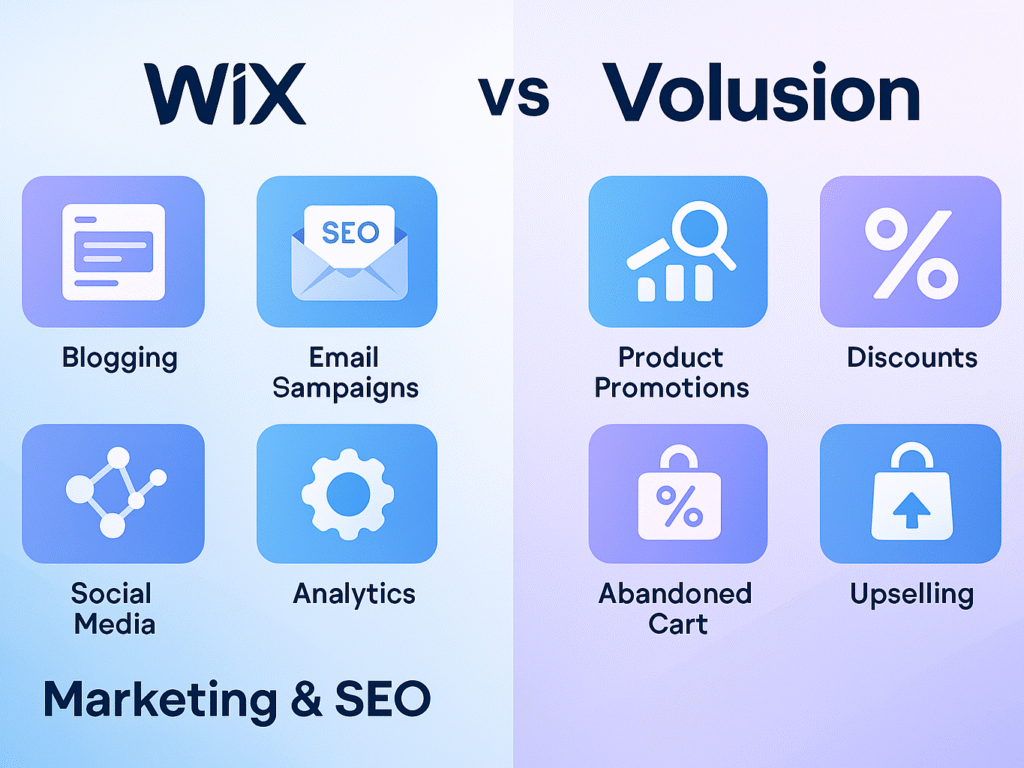
Marketing tools represent a critical factor in driving traffic and converting visitors for any e-commerce venture, making the Volusion vs Wix marketing capabilities a key consideration. In the battle of Volusion vs Wix, each platform offers distinct marketing capabilities that could influence your final decision.
Built-in Email Campaigns and SEO Settings
Both platforms provide essential marketing tools for promoting your online presence. Wix delivers a comprehensive marketing suite with built-in email campaign functionality alongside robust SEO features. It allows you to create and manage marketing emails directly within your website dashboard.
Volusion places a strong emphasis on SEO optimization, offering specialized tools designed to boost your store’s visibility in search engines. Where Wix gains a significant advantage is through its integrated blogging engine, a feature notably absent from the Volusion website builder. This blogging capability gives Wix users a powerful tool for content marketing, complete with template options, design customization tools, post management systems, and dedicated SEO settings.
For technical SEO implementation, both platforms provide the necessary settings to optimize meta descriptions, titles, and URLs. Volusion’s approach centers more specifically on e-commerce SEO tactics, whereas Wix offers broader website optimization tools.
Social Media Integration and Analytics
Effective marketing requires seamless social media connectivity. Both Volusion and Wix enable integration with major social platforms. These integrations allow you to showcase products across social channels and drive traffic back to your store.
Moreover, both systems provide analytical tools to track business performance. These reporting features help you monitor visitor behavior, conversion rates, and campaign effectiveness. With proper implementation, these analytics become invaluable for refining your marketing strategy and identifying areas for improvement.
Wix’s analytics tools are more user-friendly and visually intuitive, aligning with the platform’s overall design philosophy. Alongside social media, both platforms support selling on integrated third-party marketplaces, such as Amazon, eBay, and Google.
Promotional Features and Automation
In terms of promotional capabilities, Volusion provides robust features for creating special offers and discounts to enhance customer loyalty. The platform allows you to:
- Integrate professional slideshow features
- Set up product status indicators
- Adjust quantity parameters for promotions
- Specify location-based offerings
- Calculate shipping rates automatically
- Control stock reorder quantity levels
In essence, Volusion’s marketing tools focus on e-commerce-specific features, including abandoned cart recovery and upselling capabilities. Wix, in contrast, offers a broader marketing approach with tools that extend beyond pure e-commerce applications.
Overall, while both platforms provide essential marketing functionality, Wix maintains a slight edge with its more comprehensive and intuitive marketing suite. Your choice ultimately depends on whether you prefer Wix’s broader marketing approach with integrated blogging or Volusion’s focused e-commerce marketing capabilities.
Customer Support and Community
Behind every successful online store stands a robust customer support system. When technical issues arise or questions need answers, the quality and accessibility of help resources fundamentally shape your e-commerce experience.
Support Channels: 24/7 Chat, Phone, Email
Volusion offers comprehensive 24/7 customer support through multiple channels, including phone, chat, and email. This around-the-clock availability ensures you receive assistance whenever problems arise with your Volusion website.
Wix approaches support differently, providing 24/7 customer assistance primarily through a callback service. Their support system includes live chat in several languages, although phone support is only available during standard business hours.
User experiences vary substantially between platforms. Some Volusion users report extensive wait times, “at least 45 minutes every call”, with support staff who “never know the answer right away”. Alternatively, other customers describe Volusion’s team as “super helpful,” noting that they “get back to you quickly.”
Knowledge Base and Community Forums
The quality of self-service resources differs markedly between platforms. Volusion maintains an “info blog” alongside “start-up guides and well-curated onboarding materials” targeted at both entrepreneurs and marketing professionals. Their FAQ section receives positive feedback from users.
Wix outperforms in this category with its “extensive knowledge bases and community forums”. These forums foster “meaningful interaction between expert and novice users”, creating a collaborative learning environment. Their documentation includes webinars, videos, and comprehensive written guides.
Worth noting is Volusion’s additional support packages, available for purchase, such as “homepage optimization” and “Google Analytics training.” These supplementary services can provide valuable expertise but incur additional costs beyond those included in standard plans.
Multilingual Support Availability
For international merchants, language support capabilities matter significantly. Wix provides extensive multilingual assistance, offering “round-the-clock live chat assistance in several languages”. Their English-language support operates 24/7, with “support also offered in a limited number of foreign languages during business hours”.
Volusion lags in language diversity, offering comprehensive support primarily in English. This limitation may present challenges for non-English-speaking merchants who require technical assistance.
Interestingly, Volusion rates higher in some support evaluations, scoring 4.5/5 compared to Wix’s 3.5/5. This advantage stems partly from their specialized support team structure, providing “access to technical, design, and marketing specialists”.
Ultimately, your support preferences may determine which platform better suits your needs: Volusion’s specialized expertise or Wix’s multilingual accessibility and robust community resources.
Volusion Review 2025: Is This ECommerce Builder Still Worth It?: Get the complete breakdown of Volusion’s current features, pricing, and performance. Understand the platform’s strengths and weaknesses before making your final decision.
Security and Compliance
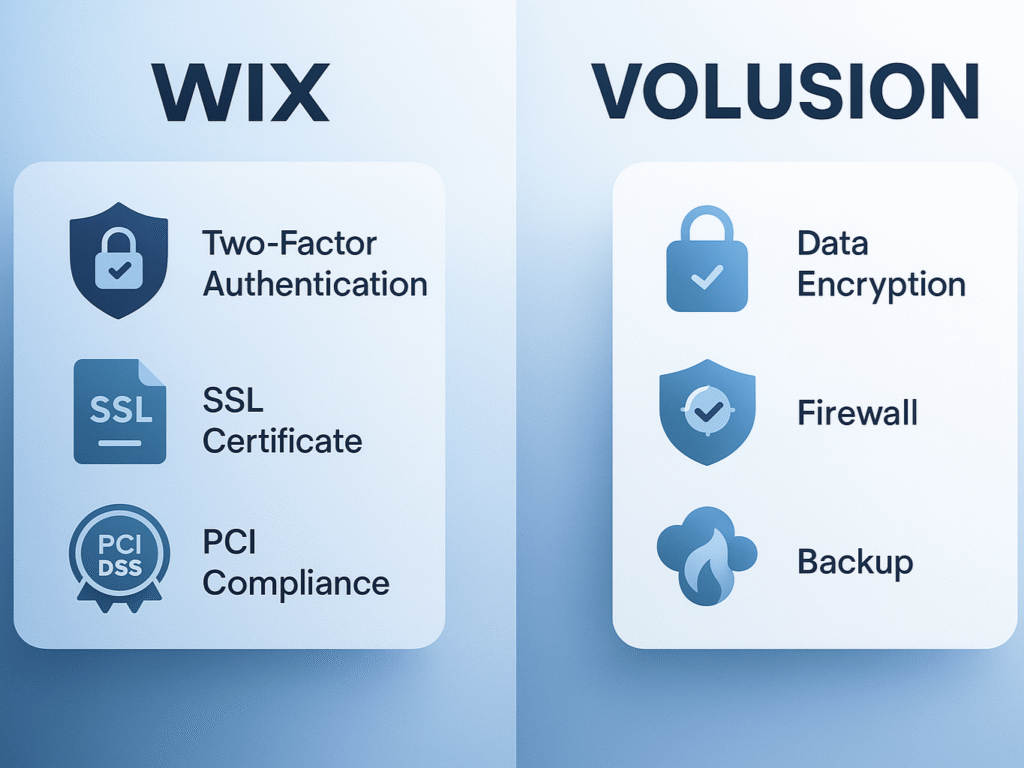
Protecting customer data remains paramount for any e-commerce operation, making security features a critical factor when evaluating Wix vs Volusion for ecommerce solutions.
SSL, PCI DSS, and Data Encryption
Both platforms implement robust security measures that adhere to industry standards. Wix maintains PCI DSS Level 1 certification, the highest level of the Payment Card Industry Data Security Standard (PCI DSS). Volusion has kept this same certification since 2006. This compliance ensures secure payment processing across both platforms.
For data protection, each service employs powerful encryption methods. Wix utilizes AES-256 encryption for data at rest, the industry’s most widely used encryption method. Similarly, Volusion implements AES-256 for the protection of sensitive data. Data transmission security relies on TLS protocols. Wix supports TLS 1.2 and above, whereas Volusion supports TLS 1.2 and later versions.
Two-Factor Authentication and Firewalls
Regarding access security, Wix provides comprehensive 2-step verification options. You can verify your account via the Wix app, SMS, authenticator apps, or email. Wix even allows users to enable multiple verification methods simultaneously. Alternatively, based on external evaluations, Volusion does not support two-factor authentication, which could create a security vulnerability.
Both platforms implement firewall protection. Wix employs firewalls and intrusion prevention systems to block unauthorized access. Volusion likewise utilizes web application firewalls (WAFs) and intrusion prevention systems (IPSs) to counter cyber threats.
Backup and Recovery Options
Concerning recovery capabilities, the approaches differ substantially. Volusion automatically backs up your site content for disaster recovery. Yet after your first free restore, subsequent recoveries incur a $199.99 fee per instance. Wix develops and maintains business continuity, incident response, and disaster recovery plans, which undergo periodic testing. However, specific backup restoration policies aren’t documented.
Beyond these features, Wix implements a multiple-layer security architecture that helps protect against zero-day security issues. As a result, every site built on Wix is automatically PCI compliant by default. For added peace of mind, all current Volusion pricing plans include a 256-bit encryption SSL certificate.
Comparison Table: Volusion vs Wix
| Feature | Volusion | Wix |
| Starting Price | $35/month | $17/month |
| Premium Plan Price | $299/month | $159/month (Business Elite) |
| Product Limit (Entry Plan) | 100 products | 50,000 products |
| Available Templates | 30 templates | 800+ templates (100+ for e-commerce) |
| Mobile Responsiveness | Built-in by default | Responsive design (requires some manual adjustments for optimal look) |
| User Satisfaction Rating | 3.8/5 | 4.4/5 |
| App Marketplace | 80+ integrations (1000+ via Zapier) | 500+ apps |
| Design Customization | HTML/CSS editing available | Drag-and-drop interface, some HTML/CSS via Velo |
| Customer Support | 24/7 phone, chat, email (plan dependent for phone) | 24/7 callback service, limited hours for phone |
| SSL Certificate | Paid ($89-$995/year) | Included free |
| Payment Processing | Multiple gateways + Volusion Merchant Service | Wix Payments + multiple gateways |
| Blogging Platform | Not available | Built-in |
| Security Certification | PCI DSS Level 1 | PCI DSS Level 1 |
| Two-Factor Authentication | Not available | Multiple options available |
| Abandoned Cart Recovery | Available (Professional plan+) | Available on all plans |
Conclusion
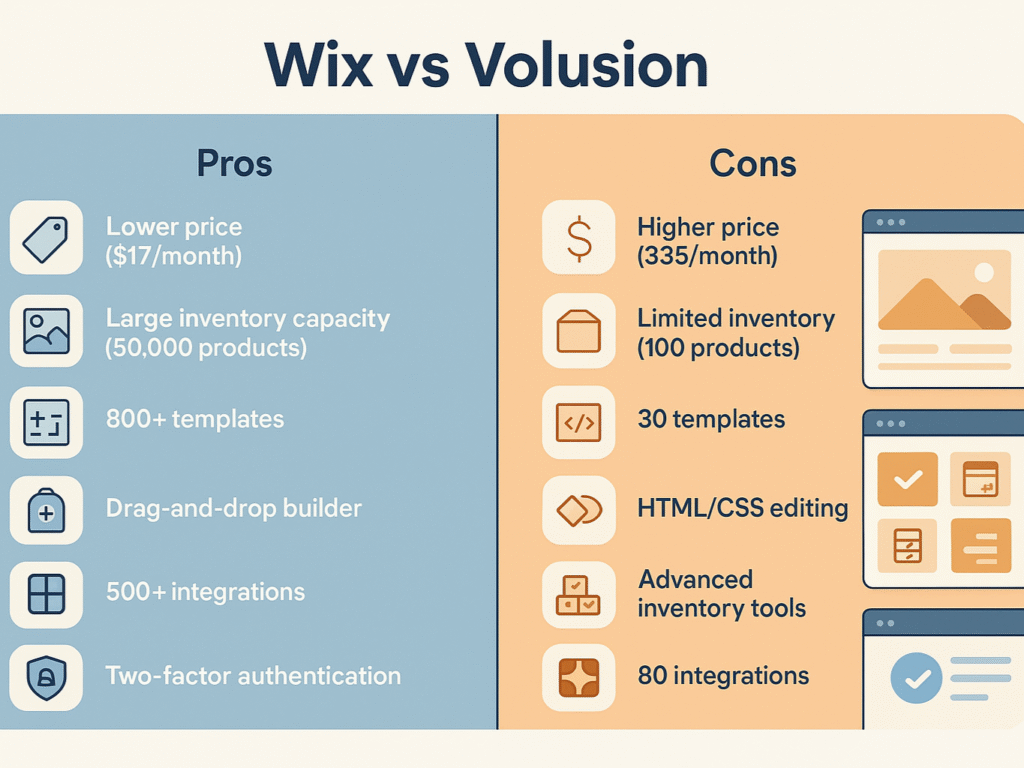
Choosing between Volusion and Wix depends on your business needs. Wix starts at $17 per month, versus Volusion’s $35. For growing stores, Wix supports 50,000 products on entry plans. At the same time, Volusion limits users to 100, making Wix the better option for scaling inventory affordably. Before making your final decision, consider reading our comprehensive Volusion review for deeper insights into the platform’s current capabilities and limitations. Additionally, if you’re exploring other alternatives, our Shopify vs. Volusion comparison and BigCommerce vs. Volusion analysis provide valuable insights into how these platforms compare to each other.
Design flexibility leans heavily in Wix’s favor with over 800 templates, compared to Volusion’s 30. While Volusion allows advanced HTML/CSS edits, it assumes technical skill. Wix’s drag-and-drop builder and AI setup make it easier for beginners to launch and customize their websites without prior coding knowledge.
Volusion excels in advanced inventory tools and structured e-commerce features, ideal for serious merchants. Wix offers user-friendly tools, abandoned cart recovery, and payment processing across all plans. Its app market hosts over 500 integrations, far more than Volusion’s 80, giving it a significant edge in flexibility.
Support and blogging capabilities also vary. Volusion offers 24/7 multi-channel support, whereas Wix limits direct phone support to specific hours. Wix also includes two-factor authentication and a built-in blog. Consider your store size, customization needs, and marketing strategy when deciding between Wix vs Volusion for ecommerce to select the platform that best aligns with your e-commerce vision. Consider your store size, customization needs, and marketing strategy when deciding between Wix vs Volusion for ecommerce to select the platform that best aligns with your e-commerce vision.


